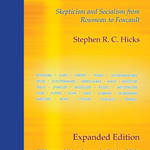In October 1980, David Horowitz wrote to his former mentor, Belgian-British leftist Ralph Miliband. A decade earlier, Horowitz had broken with the Left, both Old and New, becoming an apostate and, naturally enough, a non-person to his former comrades. As Horowitz put it in his letter:
“How could it be otherwise for people like us, for whom politics (despite our claim to be social realists) was less a matter of practical decisions than moral choices? We were partisans of a cause that confirmed our humanity, even as it denied humanity to those who opposed us. To leave such ranks was not a simple matter, like abandoning a misconception or admitting a mistake. It was more like accusing one’s comrades. Like condemning a life.”
In his fascinating letter, Horowitz paints a compelling story of the vision and social dynamic that has driven Left thought since the late 1700s.
 I quoted Miliband in Chapter 5 of Explaining Postmodernism as a good representative of the strain of Left thinking that — after the 1950s disillusionment with classical Marxism and the Soviet Union — revised Left thought away from universalist assumptions about human nature and cognition and towards race/gender/ethnic identity assumptions. Here is Miliband:
I quoted Miliband in Chapter 5 of Explaining Postmodernism as a good representative of the strain of Left thinking that — after the 1950s disillusionment with classical Marxism and the Soviet Union — revised Left thought away from universalist assumptions about human nature and cognition and towards race/gender/ethnic identity assumptions. Here is Miliband:
“Marx and later Marxists [were] far too optimistic in relying on the class location of wage earners to produce a ‘class consciousness’ that would obliterate all divisions among them. This quite clearly greatly underestimated the strength of these divisions; and it also failed to take account of what might be called an epistemic dimension, meaning that it is a great deal easier to attribute social ills to Jews, black people, immigrants, other ethnic or religious groups than to a social system and to the men who run it and who are of the same nationality, ethnicity, or religion. To acquire this class consciousness requires a mental leap which many people in the working class (and beyond) have performed, but which many other people, subject to intense obfuscations, have not … [C]lass location produces a consciousness which is much more complex and wayward than Marxism assumed; for it leads to reactionary positions as well as progressive ones …”.
To acquire this class consciousness requires a mental leap which many people in the working class (and beyond) have performed, but which many other people, subject to intense obfuscations, have not … [C]lass location produces a consciousness which is much more complex and wayward than Marxism assumed; for it leads to reactionary positions as well as progressive ones …”.
Thus, in order to accommodate the limited capacities of most people, especially the working class, the New Left increasingly made its arguments in narrower group-identity terms. Hence the rise of the hyphenated Marxists — feminist-Marxists, Afro-Marxists, nationalist-Marxists, eco-Marxists, and so on.
For more see “The Crisis of Socialism,” which is Chapter 5 of Explaining Postmodernism, especially pp. 156-159.
(Thanks to James Fencil for the link.)

I’m aware of a number of “defections” from the left like Horowitz (David Mamet is another fairly recent example that comes to mind). Given my ideology, I’m more likely to notice these than the other direction.
Are there also high profile later-in-life moves of well-known people to leftist ideology?
The great letter that Kolakowski wrote to EP Thompson as a rejoinder to Thompson’s 100 page “letter” accusing Kolakowski of being disloyal to the great cause of communism.
http://socialistregister.com/index.php/srv/article/view/5323/2224
Thanks for that, Rafe. I’ll do a separate post for that letter.
My post on Kolakowski-Thompson is here now, Rafe. Thanks again.